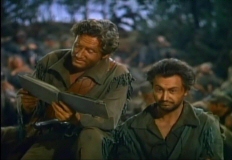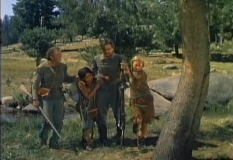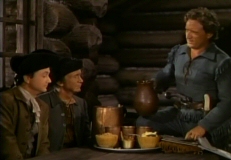Northwest Passage (King Vidor, 1940)
 King Vidorís Northwest
Passage, a terrific adventure film thatís stood the test of time, follows
the exploits of a ragtag group of soldiers called Rogerís Rangers during the
French and Indian War. Based on a novel by Kenneth Roberts, which had its roots
in reality, the film uses a Colonial-era Indian raid as a proving ground for its
cast of two-hundred. As a whole, Northwest
Passage is grittier than Howard Hawksí similar The Big Sky, which manages to instill in the viewer a genuine sense
of wanderlust. Despite a stirring speech or two from head Ranger Spencer Tracy,
this film is more intently focused on the utilitarian function of the Rangers.
Painting the Indian population as a scourge that canít meet their Manifest
Destiny fast enough, Vidorís film lacks our modern political perspective. The
prime emotional shift in Passage occurs
when an idealistic ex-Harvard man moves from wanting to paint Indians to wanting
to kill them. The constant hardship that the men face along their path to a far
off Abenaki village offers ample opportunities for male bonding, but in almost
every sequence, weíre reminded of the task at hand.
King Vidorís Northwest
Passage, a terrific adventure film thatís stood the test of time, follows
the exploits of a ragtag group of soldiers called Rogerís Rangers during the
French and Indian War. Based on a novel by Kenneth Roberts, which had its roots
in reality, the film uses a Colonial-era Indian raid as a proving ground for its
cast of two-hundred. As a whole, Northwest
Passage is grittier than Howard Hawksí similar The Big Sky, which manages to instill in the viewer a genuine sense
of wanderlust. Despite a stirring speech or two from head Ranger Spencer Tracy,
this film is more intently focused on the utilitarian function of the Rangers.
Painting the Indian population as a scourge that canít meet their Manifest
Destiny fast enough, Vidorís film lacks our modern political perspective. The
prime emotional shift in Passage occurs
when an idealistic ex-Harvard man moves from wanting to paint Indians to wanting
to kill them. The constant hardship that the men face along their path to a far
off Abenaki village offers ample opportunities for male bonding, but in almost
every sequence, weíre reminded of the task at hand.
 In many of its scenes, especially those
depicting and following the attack on the Abenaki village, Northwest Passage almost prompts knee-jerk comparisons to the
Vietnam War and the films that followed it. Of course, thereís no way that
that sort of historical foresight would have been possible for Vidor, but it
becomes clear in viewing the film that many of the horrors that seemed to
surface only after that conflict were already present in our national cinema,
even before WWII. The scenes depicting the deterioration of troop morale and the
horrors of cannibalism are about as harrowing as any in the Production Code era.
Vidorís relatively uncompromising take on his heroesí plight only heightens
the sense of adventure, though. While the survivalist exploits of the men
(including an exciting river forging via a human chain) are noteworthy, itís
like the memory of the battle against the Abenaki, and the graphic descriptions
of the torture theyíve inflicted that will linger in the viewerís mind.
In many of its scenes, especially those
depicting and following the attack on the Abenaki village, Northwest Passage almost prompts knee-jerk comparisons to the
Vietnam War and the films that followed it. Of course, thereís no way that
that sort of historical foresight would have been possible for Vidor, but it
becomes clear in viewing the film that many of the horrors that seemed to
surface only after that conflict were already present in our national cinema,
even before WWII. The scenes depicting the deterioration of troop morale and the
horrors of cannibalism are about as harrowing as any in the Production Code era.
Vidorís relatively uncompromising take on his heroesí plight only heightens
the sense of adventure, though. While the survivalist exploits of the men
(including an exciting river forging via a human chain) are noteworthy, itís
like the memory of the battle against the Abenaki, and the graphic descriptions
of the torture theyíve inflicted that will linger in the viewerís mind.
 As in most war movies, the camaraderie
between the troops between crises provides most of the characterization in Northwest Passage. The ensemble of character actors assembled here
provides a series of memorable turns thanks to a script thatís surprisingly
short on sentimentality. Due to circumstances along this trail, deaths arenít
even graced with a funeral. That tough-minded practicality filters into the
performances, and the film is better for it. It almost goes without saying that
the picture would play better without its overburdened epilogue, but itís a
testament to the strength of whatís come before that its heart-tugging
attempts to place this story in a larger historical context feel redundant.
As in most war movies, the camaraderie
between the troops between crises provides most of the characterization in Northwest Passage. The ensemble of character actors assembled here
provides a series of memorable turns thanks to a script thatís surprisingly
short on sentimentality. Due to circumstances along this trail, deaths arenít
even graced with a funeral. That tough-minded practicality filters into the
performances, and the film is better for it. It almost goes without saying that
the picture would play better without its overburdened epilogue, but itís a
testament to the strength of whatís come before that its heart-tugging
attempts to place this story in a larger historical context feel redundant.
76
02-07-2005
Jeremy Heilman